- Home
- Hugh Howey
Beacon 23: The Complete Novel Page 10
Beacon 23: The Complete Novel Read online
Page 10
• 20 •
The lock module is empty. Bare. The hatch to the other lifeboat is open, so I check inside. If there was a loss of atmo, this is where any survivors would go. But this beacon has a lifeless feel. Sterile. Like a vacuum. Any hope of finding someone over here vanishes. The neighbor’s Maserati just has its hazards going off. I glance at my O2 levels in the suit and head for the ladder, knowing NASA would at least want me to turn off the emergency signal and investigate. One flight up is the life support and mechanical module. My boots clang on the rungs, the sound muffled by my helmet.
The mechanical module might as well have shrink-wrap on it. Everything gleams. There are no loose wires dangling from all the add-ons and repairs cobbled together over the years. No oil streaks running down the pumps from worn-out seals. No blistered and peeling paint. No rust or signs of age. She’s like a shaved-head recruit standing there, holding her neatly folded fatigues, not a scar on her smooth flesh. Gazing at the room around me, all I can think of is the grief to come. All I can see are the bolts whizzing like bullets in the cosmos around us. All I want to do is throw myself over her grav generator and shield it with my body, keeping everything safe, not letting a damn thing touch her—
There’s a bang somewhere above me. Distant. Muffled. Like the debris heard me and reached out and slapped this nubile recruit. Like our drill sergeant caught me smiling at her. I grab the ladder leading up to the living quarters and clomp up the rungs. More newness here. I touch the sleep sack. Wish I could pop my helmet open and see what they smell like out of the factory, before dozens of people have slept in them.
Another bang, nearer now. This one startles me, because even through the suit, I can feel that the bang is inside the beacon, not against the hull. That’s when I notice the duffel bag in the galley. Personal effects. Through the porthole, I can see the dash, dash, dash of an open-mouth O as the light outside continues to flash in alarm.
I grab the next ladder and climb up into the command module. I’m not alone. Two legs jut out from under the command dash, sheathed in white NASA sweatpants. Two bare feet. Ten toes splayed upward. Unmoving. Like a body pulled halfway out of a morgue drawer. The upper half of the person is concealed. I think of what it would be like to die like this, asphyxiating, choking on empty, burning lungs. I’ve thought about that a lot.
I approach the body. This one’s not your fault, I tell myself. I couldn’t have gotten here any quicker. I need to pull the body out to inspect it and determine the cause of death. Reaching down, I grab one of the ankles, and the body spasms. Kicks. There’s a shout and a bang. More kicking at me, legs scrambling like they’re riding a bicycle, and then hands gripping the edge of the dash, a face appearing, loose strands of hair over wide eyes and an angry mouth. The muffled sound of someone shouting at me: “What the fuck?!”
•••
We stare at one another. It’s a woman. Her lips are moving. She has no helmet on, which makes mine feel silly. I reach to open the visor, and there’s only a slight twinge of fear that maybe she’s an apparition, and maybe I’m not in a beacon at all but out in the cold vacuum of space, and I kinda hope that this is true—
But I breathe atmo when I pop the visor. And I hear the end of her last sentence:
“—the hell’d you come from?”
She waits for an answer. This is an easy one. I got this one.
“Beacon 23,” I say.
We stare some more. This is awkward.
“I’m— I saw the distress. Are you— Is everything okay?”
“I was just fine until you scared the ever-living shit out of me.” The woman brushes some of the loose hair off her face. She’s the most beautiful thing I’ve ever seen. Some distant part of me knows that this is because I’ve been alone for a long time, and because the last person I loved recently died in my arms, and because I’m just glad this person isn’t dead, but there’s another part of me that thinks she really might be that gorgeous.
“What’s going on?” I ask.
“What’s going on? I’ll tell you what’s going on, those idiots in Texas’ve built near on two thousand of these buckets, and they still can’t send them out without all these glitches. Can’t one of these things boot up and work the first time? Is that too much to ask? It must be too much to ask. Hand me that spanner.”
There’s an open toolkit on the deck, just under the dash. I hand her the spanner, and she ducks back out of sight. My walk suit feels bulky. I shrug under the weight of it all. I feel like taking off my helmet.
“So they sent you out here to operate this thing, and it doesn’t even work?” I ask.
“They never work,” she tells me. “Not at first.” Her voice is a bit muffled by the cavity she’s working in, and a bit by my helmet. “And I’m not an operator.” She peers out at me from the gloom. “Do I look like an operator to you?”
She looks like a normal person to me. Does that mean “no”? Does that mean I don’t look normal? I guess I don’t. I decide to leave my helmet on. I’ve got a week’s worth of growth on my chin, and my hair is a shaggy mop that wouldn’t pass muster in the army or at NASA.
“I guess not,” I say.
“I’m a tuner,” she says. “I get these things working so your lot can survive in them. But right now, I’m trying to get all the sensors that’re telling this bucket everything’s wrong to understand that everything’s not wrong. She’s all haywire.”
“A tuner,” I say. It’s the first I’ve heard of them. Sounds like something a piano needs, not a trillion-dollar piece of astral navigation machinery.
The woman leans out of the cavity again, sitting up. Her hair is matted down in places with perspiration. Most of it is in a ponytail. Light brown, with a hint of red. And emerald eyes. I’m an unblinking fool. And the walk suit is damn hot.
“Yes, a tuner,” she repeats. “Pass me that bolt, please?”
I break my stare and look where she’s pointing. There are small bolts that I recognize, the ones that hold the control consoles to the main panel. I hand her the bolt, but only after slipping one of the lock washers on it. She narrows her eyes at me like she just watched a monkey perform a trick. “I’m Claire.” She holds out her hand, which is streaked with grease. I shake it. “What d’you go by?”
I laugh. Nerves, I guess. “Lately, I go by That Idiot. In the army, they just called me Soldier. But back in flight school, we were given call signs.”
She laughs. “What was your call sign?”
“It wasn’t a very good one,” I warn.
“Lay it on me. Another bolt, please.”
I prep and hand her another bolt. “My call sign was Digger.”
Claire’s laugh echoes from within the cavity. I shift in place while she works.
“It was supposed to be Tomb Digger,” I explain. “Which is . . . you know . . . really badass. But my flight instructor didn’t like me, and he saw me rub my nose one time, and said I was a nose digger, and that from then on I’d just go by Digger. So that was it.” I shrug, even though she’s not looking.
“Tell the truth,” she calls out. “You were picking your nose, right? Not just scratching it. Give me the lock nuts.”
Her hand emerges. I place the three lock nuts in her palm. “I may have been picking it,” I say. “I’m not proud.”
“No, you’re not. I can tell that about you.”
I can’t determine if this is a compliment or not. It definitely doesn’t feel like a compliment.
“So where’d you serve, soldier?”
“All over. Orion. Humbolt. Dakka. Did my first tour on Gturn.”
Claire whistles. “They always had you in the shit, didn’t they?”
“Hip deep.”
She wiggles free from the space, and I move back to give her room. She has on a white NASA tank top. No bra. A trim and muscular physique. Not what I expect in an egghead. She starts working on one of the main consoles, and I watch, following what she’s doing. Looks like a master reboot sequ
ence, but she’s rewriting the config.sys before it goes through, coding faster than I can type.
“Let’s see if this works,” she mutters.
The lights go off around us. Pitch black. There’s a distant thunk from the massive power relays two floors below. Pinpricks of light make themselves known through several of the portholes as my eyes gradually adjust. There’s something sensual about this, exhaling and inhaling in that dark space with someone else. I can feel her presence like I have radar. I can tell there’s another person in the darkness with me, that I’m not alone. I stand frozen, afraid to move my limbs, afraid of what I might do with them.
The lights come back on. Claire is staring intently at one of the portholes. I look as well. The pulsing, fluttering, palpitating, unsure lights of the shocked and alarmed have returned to that steady metronome, that constant and confident pulse.
Claire smiles at me.
“Much better,” she says.
I agree.
• 21 •
Cricket pounces on me as I enter the lifeboat. She holds me against the deck, massive paws on my chest, and growls and growls. Clamping down on my arm with her mouth, she squeezes like she wants to bite me. But she just holds me there, making threatening noises in her throat.
I let her have it out and scratch her neck. Relenting, she lets go, mews at me, then licks my face through my open visor.
“I know, I know,” I tell her, stroking her head, trying to calm her down. “I’m sorry. Everything’s okay. I’m sorry.”
I exude these thoughts. Cricket lowers her weight against me, as if we’re going to lie just outside the airlock and take a nap.
“Up,” I say. “We gotta go. Can’t abandon our station. Everything’s okay here.”
Better than okay. But I can’t stay. After an hour of watching Claire work, sweating in my walk suit, feeling useless and awkward, I had to beg my leave. Despite every craving in every cell of my body, I had to beg my leave.
Cricket and I head back to our beacon at half-thrust. I leave one of the displays set to the rear camera, and I watch the unblemished and new recede as I crawl across empty space toward my rundown home. Cricket is passed out on the seat beside me, her body sprawled over the armrest so that her head can reach my arm, pinning it to my seat with the weight of her exhaustion. Must’ve worn herself out pacing and fretting while I was gone. When I need to adjust the throttle, I lean across and use my left hand so I don’t disturb her. What the hell am I doing? Aiding and abetting a fugitive, and now harboring an alien. This is what happens when they give you medals for breaking the rules: you forget the rules apply to you.
Opening the airlock to my home, I smell the tiredness of the place. The clean atmo in the other beacon cleared my nostrils, and now I can smell that the air I live in isn’t foul so much as stale. The scrubbers are doing their job more admirably than I thought. Hell, they’re doing their job more admirably than I am.
Shedding the walk suit, I head toward the ladder. Cricket seems to read my mind and leaps for it first. She wraps her paws around a rung halfway up, lunges again, and grabs the lip. Elbows jut down as she scrambles, rear legs wheeling, tail corkscrewing. Every time she goes up a ladder, it looks like she might not make it, but she always does. I’m already climbing up behind her, the air cool on my sweaty skin, just my sleep shorts on. Cricket takes advantage of my hands being occupied at the top of the ladder and gets in a lick on my head and one on my cheek before I can ward her away.
“No lick,” I tell her, wiping my cheek. I’ve tried to train this out of her. “Never lick me again,” I say, shaking a finger at her. She sits and cocks her head to the side. “Last time. Never again. No licking. I mean it.”
Her tail swishes the steel grating. I pat her head. I swear she can read my mind, and yet somehow she doesn’t seem to hear a word I say. I scratch behind her ears and ask, “These are just for decoration, aren’t they?”
She licks my hand. I don’t know why I even try.
Up another ladder, I start the shower pod. I let it steam up inside, the water recycling over and over. When it looks like one of those cig smoking rooms in a spaceport, I crack the door and step through the fog and into the scalding hot. The death and tiredness boils off my skin. I scrub the old cells away, getting at the new me beneath. Soap and lather. I fumble for my razor and run it under the showerhead before rolling it across my face. Little patches of hair elude me. I wash my hair, then turn my back to the jet and just let the heat pound into my spine. Water so damn hot. I pee while standing there, remembering Hank from B Company who used to get angry when anyone did this. One whiff of pee in the showers, and Hank’d go ballistic, looking everywhere for the yellow stream. We’d accuse him of using this as an excuse to go around studying our dicks.
Hank was my best friend in the company—for all of the two weeks he was alive with us in the trenches. It was a long two weeks. There aren’t any rules about how long you gotta know someone to know you love them. The army taught me that. You can hate the moment you line up your barrel, and you can love the second you lower it. Back and forth like that. Oscillating grav panels. There’s no up or down to the cosmos, just a whole bunch of fucking sideways. Just people loving and hating. And no rules on how long it takes.
I turn off the shower as the heat starts to die down from boiling to mere scalding. My flesh is red. Steam rises off me as I leave the pod. Cricket is fast asleep on my bed; she wakes long enough to glance at me, to make sure she isn’t missing anything, then goes back to sleep.
I rifle through my clothes, sniffing everything. All the same degree of mildly clean. It’s only now that I see the amber light flashing over my bunk. Damn. Message on the QT. I go up the ladder two rungs at a time and check the display. Three messages from NASA asking me to report back in about the SOS.
I key in the number 55. Then I press through three screens of warnings before the entangled particles tickle their entangled twins back in Houston. Five by five is what someone used to say back in some other time to mean that everything is okay. Not sure why this is any more efficient than just saying OK. It probably has something to do with the state of Oklahoma. All their fault. Just like it’s Germany’s fault we have to say the number nine as “niner.” Everyone causes trouble. It’s not just me.
I turn the message alarm off and walk a big circle around the command module. Then another circle. Cricket wakes up below, realizes I’m gone, and arrives at the command module with two leaps, a grunt, and some kicking. She curls up on the blanket I leave under the dash for her and watches me pace.
I shake my arms like they’re still wet, like there’s something in them I need to get out, like those nerves a soldier feels before a big push out of the trenches. What the hell is wrong with me? A trickle of water runs down my breastbone, leaking from the porous rock I wear around my neck. I wipe this away, cross to the porthole, and watch the flashing light for a while. I turn to the HF, wondering what I would say if I picked it up. I turn back to the light.
This is worse than being completely alone.
• 22 •
I dream of my company that night. My old company. B Company.
Bravo, boys.
Take a bow.
Clap Company.
The kind of clap you don’t want to receive.
They cured that shit centuries ago, but they still called us the VD crew. Very Desperate. Veterans Disabled. Vaginas & Dicks. Vapor Dust. But my favorite: Verily Dead.
You need one company set aside for the glory runs and photo-ops. That’s not us. That would be the Alpha Company boys and girls. They think they’re the shit, because they get the milk runs. Might seem like they get the worst targets, the toughest assignments, but they’re the targets with all the intel, the battles we know we can win. A good chess player doesn’t send out the queen unless he knows she’s gonna take a couple pawns and not take a nick. So the top scorers, the squeaky clean, the square-cut jaws, the Aces and Champs, they get sent out with the best gear and t
he best air support and the best artillery crews and the biggest budgets, and they always get their buggers.
Charlie Company is for those you barely trust with a gun. The swinging barrels in a crowded dropship that have you ducking so fast you throw your back out.
That leaves Bravo Company, the expendables who know what they’re doing. When you’ve gotta hit something, and you don’t know its soft spot, you clap twice for Company B.
SIR YES SIR! SIR, MOTHERFUCKING RIGHT, SIR! SIR, AIM ME AND FIRE, SIR!
We think on our boots in Company B. We fight our way, bewildered, through the confusion and the haze. We don’t make it out the other side, not all of us. But somewhere, there’s the click of a pen, a proud signature, a father’s hand on a young man’s shoulder, and we reload. That’s the sound of our collective gun cocking, the click of that pen. That’s us racking another round in the chamber. Fire that boy out, hope you hit something. If he gets three before he goes home in his own bag, then the numbers look good. That father gets his medal. No one else to wear it. Goes in a frame above the mantel, and on holidays glasses are raised. First you raise the kids, and then you raise a toast.
I see it all in my dreams; I see it every night. The shrapnel seems to come from the earth. When the kinetic missiles hit, the ground vomits hot death. An eruption of soil, a cloud of screaming metal reaching out for the unfortunate, grabbing limbs and lives with abandon.

 Refuse (The Silo Archipelago Series Book 1)
Refuse (The Silo Archipelago Series Book 1)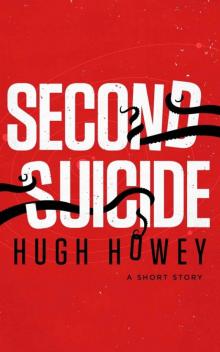 Second Suicide: A Short Story
Second Suicide: A Short Story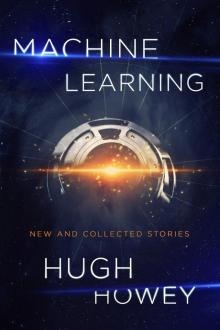 Machine Learning: New and Collected Stories
Machine Learning: New and Collected Stories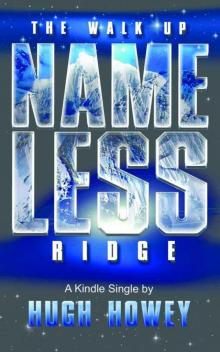 The Walk Up Nameless Ridge
The Walk Up Nameless Ridge Half Way Home
Half Way Home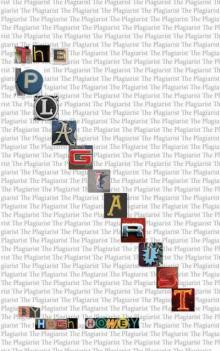 The Plagiarist
The Plagiarist Peace in Amber
Peace in Amber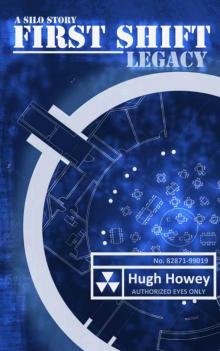 First Shift: Legacy
First Shift: Legacy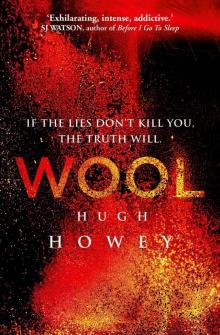 Wool
Wool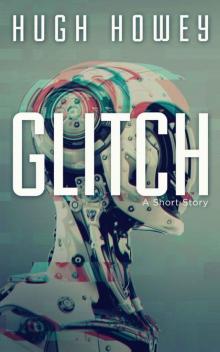 Glitch
Glitch Shift
Shift Dust
Dust Molly Fyde and the Land of Light
Molly Fyde and the Land of Light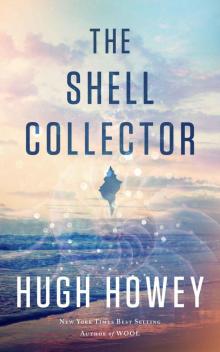 The Shell Collector
The Shell Collector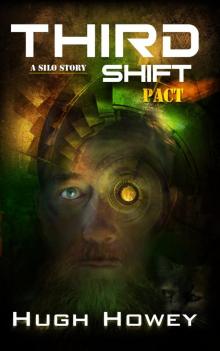 Third Shift: Pact
Third Shift: Pact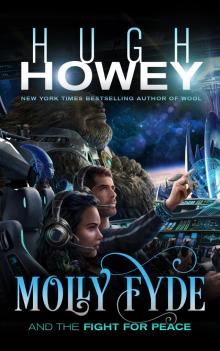 Molly Fyde and the Fight for Peace
Molly Fyde and the Fight for Peace Sand Omnibus
Sand Omnibus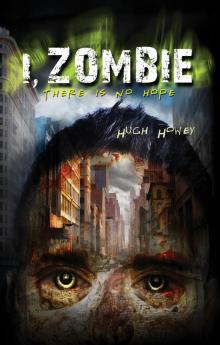 I, Zombie
I, Zombie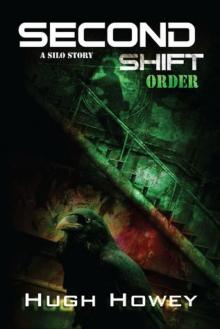 Second Shift: Order
Second Shift: Order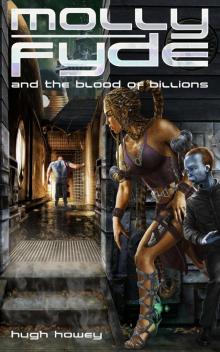 Molly Fyde and the Blood of Billions
Molly Fyde and the Blood of Billions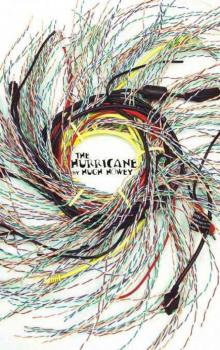 The Hurricane
The Hurricane The Box
The Box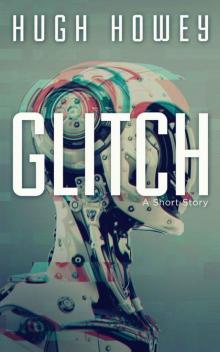 Glitch_A Short Story
Glitch_A Short Story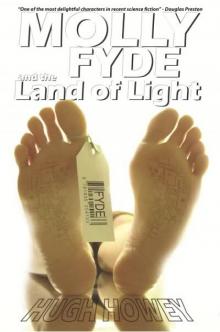 Molly Fyde and the Land of Light tbs-2
Molly Fyde and the Land of Light tbs-2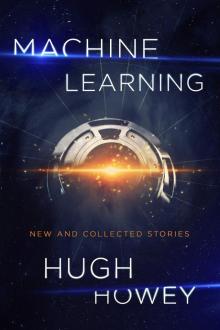 Machine Learning
Machine Learning Resist
Resist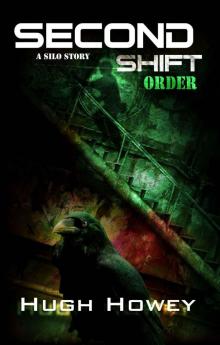 Second Shift - Order (Part 7 of the Silo Series) (Wool)
Second Shift - Order (Part 7 of the Silo Series) (Wool)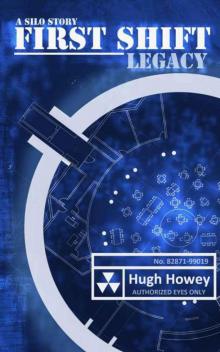 First Shift - Legacy s-1
First Shift - Legacy s-1 Stories on the Go: 101 Very Short Stories by 101 Authors
Stories on the Go: 101 Very Short Stories by 101 Authors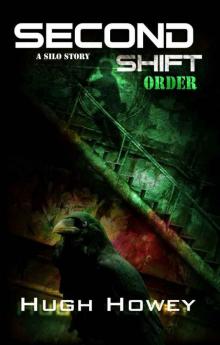 Second Shift - Order s-2
Second Shift - Order s-2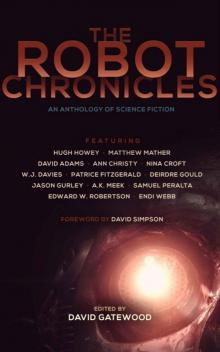 The Robot Chronicles
The Robot Chronicles Molly Fyde and the Blood of Billions tbs-3
Molly Fyde and the Blood of Billions tbs-3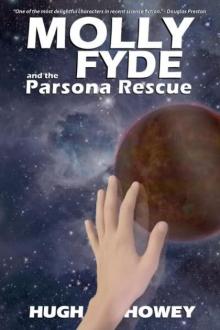 Molly Fyde and the Parsona Rescue tbs-1
Molly Fyde and the Parsona Rescue tbs-1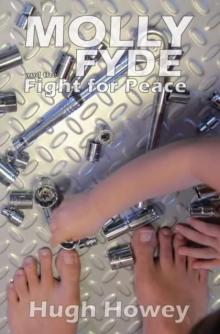 Molly Fyde and the Fight for Peace tbs-4
Molly Fyde and the Fight for Peace tbs-4 Sand
Sand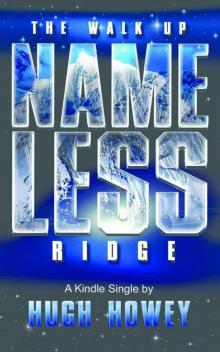 The Walk Up Nameless Ridge (Kindle Single)
The Walk Up Nameless Ridge (Kindle Single) Wool Omnibus Edition (Wool 1 - 5)
Wool Omnibus Edition (Wool 1 - 5) The World of Kurt Vonnegut: Peace in Amber
The World of Kurt Vonnegut: Peace in Amber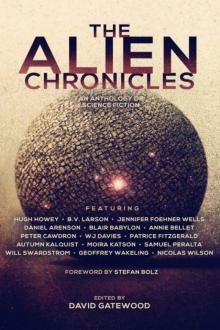 The Alien Chronicles
The Alien Chronicles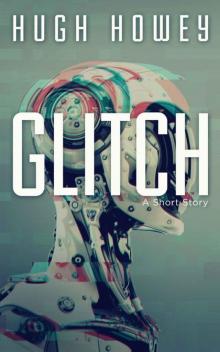 Glitch: A Short Story (Kindle Single)
Glitch: A Short Story (Kindle Single)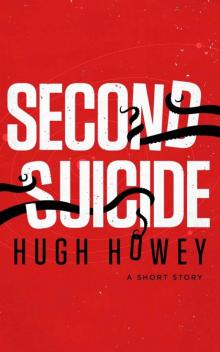 Second Suicide: A Short Story (Kindle Single)
Second Suicide: A Short Story (Kindle Single)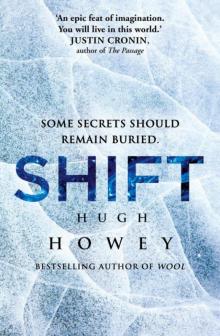 Shift (silo)
Shift (silo)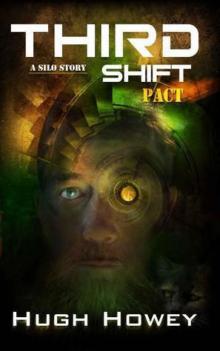 Third Shift - Pact
Third Shift - Pact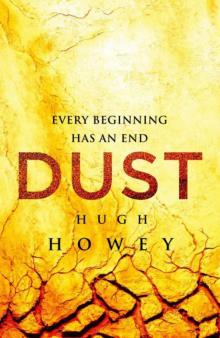 Dust s-9
Dust s-9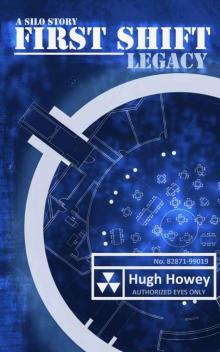 First Shift - Legacy (Part 6 of the Silo Series) (Wool)
First Shift - Legacy (Part 6 of the Silo Series) (Wool)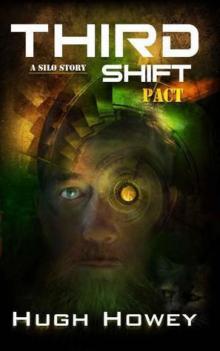 Third Shift - Pact s-3
Third Shift - Pact s-3 Sand: Omnibus Edition
Sand: Omnibus Edition The Box: A Short Story
The Box: A Short Story